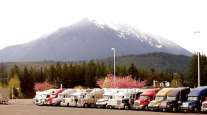Senior Reporter
California Trucking Association Sues to Block CARB Rule

[Stay on top of transportation news: Get TTNews in your inbox.]
The California Trucking Association has filed a federal lawsuit seeking to block enforcement of the California Air Resources Board’s Advanced Clean Fleets regulation that would require motor carriers operating in the state to transition their trucks to zero-emission vehicles beginning as soon as next year.
The lawsuit asks the federal court to grant a preliminary and permanent injunction barring CARB from implementing or enforcing the regulation “in any way.”
In a note to its members, CTA CEO Eric Sauer said the lawsuit is aimed at federal law violations, including conflicts with the Federal Clean Air Act and the Federal Aviation Administration Authorization Act of 1994.
“Litigation was not our desired path concerning the industry’s transition to zero emissions, but conflict was inevitable once it became clear that CARB embraced a make-believe view of what could be accomplished with today’s technology and infrastructure,” CTA said. “In doing so, the agency violated multiple state and federal laws and, accordingly, these issues will be brought before the courts by CTA and multiple other entities.”

Sauer
The lawsuit, filed Oct. 16 with the U.S. District Court for the Southern District of California, seeks to “permanently enjoin enforcement of the ACF regulation.”
The lawsuit said that the Advanced Clean Fleets rule comprises four principal regulatory provisions: regulations designed to phase in zero-emission vehicles to fleets for state and local governments, regulations designed to phase in zero-emission vehicles for high-priority fleets, regulations designed to phase them in for drayage fleets, and a 100% zero-emission vehicle sales mandate effective in 2036.
“Because the ACF regulation is aimed at transforming not only the vehicles sold within California’s borders, but virtually any vehicle that enters those borders, CARB has disregarded what the United States Supreme Court has declared to be Congress’s carefully calibrated regulatory scheme,” the lawsuit said.
The regulation was approved by the CARB board April 28, despite concerns expressed by some truckers that battery or fuel-cell electric trucks may not be available as soon as required, or that there might not be an adequate electric charging infrastructure ready in time.
CARB’s goal is to have fleets operating in the state be 100% electric by 2035, 2040 or 2045, depending on size and type of truck.
Want more news? Listen to today's daily briefing above or go here for more info
“Since 2020, our nation has realized the essential role that the logistics industry plays in supplying the lifeblood of our nation’s economy and that this industry becomes pressured in the face of uncertainty,” the lawsuit said. “Instead of providing an assurance of clear and compliant regulations, the California Air Resources Board has promulgated the Advanced Clean Fleets regulation, which expands California’s regulatory authority well beyond its borders and establishes such untenable mandates that CARB itself has already been compelled to informally promise certain provisions will not be enforced.”
The lawsuit said the adoption of the Advanced Clean Fleets regulation represents a direct regulation of the trucking industry with acute impacts on “prices, routes and services in direct conflict with congressional policy.”




